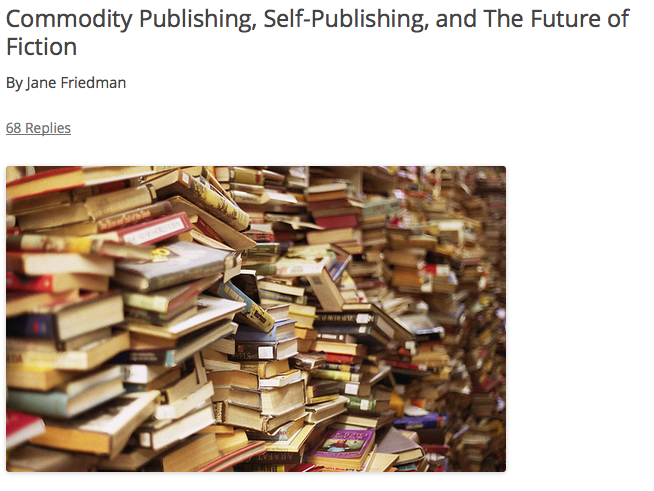 Jane Friedman has a provocative post about self-publishing that has the potential to rekindle age-old genre wars: whether or not genre is “serious” fiction. But that’s not really what she’s getting at. Her point is that there’s a different process for how much genre fiction is consumed, and this is how the self-publishing industry is evolving. She writes:
Jane Friedman has a provocative post about self-publishing that has the potential to rekindle age-old genre wars: whether or not genre is “serious” fiction. But that’s not really what she’s getting at. Her point is that there’s a different process for how much genre fiction is consumed, and this is how the self-publishing industry is evolving. She writes:
This model relies on a readership that consumes books like candy, or readers mostly interested in finding a next read as quickly and cheaply as possible. (We’re starting to see the impact of this cheap-read behavior: agents asking publishers to reduce prices because it’s inhibiting the greater volume needed to reach maximum profits.)
If you’ve ever walked into certain kinds of used bookshops (especially back before e-books became prevalent), you’ve seen the racks and racks of mass-market romances and other genre fiction, sold for 25 cents each. A customer might walk in, buy a grocery bag full, walk out, then return the following week for a refill.
The new era of self-publishing authors[2] are, by and large, serving these customers.
I call it commodity publishing. It’s not about art; it’s about product.
This is eye-opening to me, and possibly something that I’ve kept from admitting to myself. Self-publishing really is best-suited for a certain kind of pulp writing. I write genre fiction myself, but it’s not Da Vinci Code-style genre fiction (which I like, by the way, but it’s not what I write). My writing is more cerebral, takes time to build. Takes more patience. And I’ve seen this reaction in reviews to my book – some people call it “boring” or “confusing.” I can admit this with confidence because I don’t think they are boring or confusing, but they may be to someone who wants an action scene on every page. I’ve seen “boring” used to describe many other books than my own – “boring” is the new “literary” in Amazon reviews.
If you’re participating in free promotions, your book is going to be lumped in with a lot of other books that might not fit in the same category – people who bought this also bought…And so someone will try to read your book who probably shouldn’t, hate it, then leave a one-star review. Someone who consumes a book without thinking very much probably isn’t going to write a very thoughtful review either.
Frankly, it’s had me doubting my whole self-publishing experiment – and I started this site – because my type of fiction is much better suited to having the backing of a major publisher who has access to major – and, yes, smarter – reviewers.
But then, it’s extraordinarily hard to break into the traditional arena as well, especially when this is their attitude (emphasis added).
JG: What do you look for in a self-published author or work?
JC: Without giving away too many trade secrets, I always look for somebody that has a great ability for telling a story and who tells a story fast. With a lot of the self-published authors I’ve been working with, what I’d call the indie author in the new adult area, they tell a story in a different fashion. It’s really fast paced and there aren’t a lot of characters. I see how good they are at telling the story and how well they maintain my level of interest.
In which I’m reminded: this is why I fled traditional publishing in the first place. Because they’re looking for easy-to-read, easy-to-define books as well.
The moral: it’s hard out there for a slightly-more-difficult book.
This comment on Friedman’s post gets at it, and it’s similar to my experience. There’s no choice but to roll ahead and try to find those readers who love what you do, and ignore those who don’t.
I have two literary agents, I write unusual stories, which agents and editors praise for their originality – and then reject because they’re not like everything else. I self-published my first novel because otherwise it would have spent its life locked up by the gatekeepers. It’s getting reviews that suggest it’s seen as a serious work, and many of those reviews express surprise that it wasn’t picked up by a publisher and launched properly.
I can’t be the only writer in this position. Although many self-publishers do opt for writing genre fiction, there must be a sizeable minority like me who want to tell stories with a bit of heft, quality and scope, and have laboured at it for long enough to make a reasonable job of it. Publishers don’t want us – probably for good commercial reasons, but they don’t. So we have no choice but to self-publish.
It’s not easy. It probably isn’t profitable. But then, getting published traditionally is rarely profitable either – especially as these books take so long to write. But I am so very, very glad I self-published my literary novel and I would urge others in my position to do the same.
Get an Editorial Review | Get Amazon Sales & Reviews | Get Edited | Get Beta Readers | Enter the SPR Book Awards | Other Marketing Services






















Oh, that’s a fabulous cut from the Curr interview! Appreciate you mentioning the post and combining these excerpts together to exhibit the trend, which neither of us are terribly fond of.